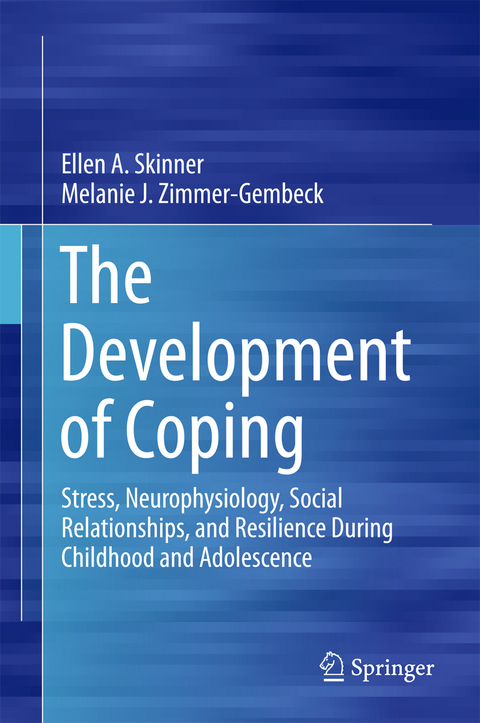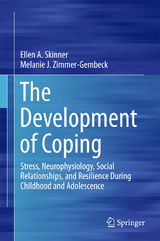The Development of Coping
Springer International Publishing (Verlag)
978-3-319-41738-7 (ISBN)
In addition, chapters track how coping develops, starting from birth and following its progress across multiple qualitative shifts during childhood and adolescence. The book identifies factors that shape the development of coping, focusing on the effects of underlying neurobiological changes, social relationships, and stressful experiences. Qualitative shifts are emphasized and explanatory factors highlight multiple entry points for the diagnosis of problems and implementation of remedial and preventive interventions.
Topics featured in this text include:
- Developmental conceptualizations of coping, such as action regulation under stress.
- Neurophysiological developments that underlie age-related shifts in coping.
- How coping is shaped by early adversity, temperament, and attachment.
- How parenting and family factors affect the development of coping.
- The role of coping in the development of psychopathology and resilience.
Ellen A. Skinner, Ph.D., is a leading expert on the development of children’s motivation, coping, and academic identity in school. She is a Professor in the Psychology Department at Portland State University, in Portland Oregon. As part of Psychology’s concentration in Developmental Science and Education, her research explores ways to promote students’ constructive coping, ongoing classroom engagement (marked by hard work, interest, and enthusiasm), and perseverance in the face of obstacles and setbacks. She is especially focused on two ingredients that shape motivational resilience: (1) close relationships with teachers, parents, and peers, and (2) academic work that is authentic and intrinsically motivating. Melanie J. Zimmer-Gembeck, Ph.D., is a leading expert on social relationships, stress and coping, and autonomy and identity during adolescence. She is a Professor in the School of Applied Psychology and Menzies Health Institute of Queensland, at Griffith University in Queensland, Australia. She also directs The Family Interaction Program, a center that develops, pilots, evaluates and disseminates innovative programs for children, adolescents, and families, focusing especially on building family supports for children aged 1 to 12. Her broad range of research interests and funded projects include parent-infant attachment, stress and other important family issues, adolescent development as associated with couple (dating), peer and family relationships, adolescent sexual behavior and sexuality, the development of emotional, cognitive and behavioral regulation, interpersonal rejection and sensitivity to rejection, and appearance-related concerns.
Section I: Constructing "Developmentally-Friendly" Conceptualizations of Coping.- Chapter 1. Coping as Action Regulation Under Stress.- Chapter 2. Ways and Families of Coping as Adaptive Processes.- Section II: Review of Research on the Development of Stress Reactivity and Ways of Coping.- Chapter 3.Age Differences and Changes in Ways of Coping Across Childhood & Adolescence.- Chapter 4. Neurophysiological Developments that Underlie Age-Related Changes in Coping.- Section III: Normative Development of Coping within the Context of Relationships with Caregivers.- Chapter 5. Development of Coping in Newborns.- Chapter 6. Development of Coping During Infancy.- Chapter 7. Development of Coping During Toddlerhood.- Chapter 8. Development of Coping During Early Childhood.- Chapter 9. Development of Coping During Middle Childhood.- Chapter 10. Development of Coping During Adolescence.- Section IV: Foundations of Coping and its Differential Development.- Chapter 11. Early Adversity, Temperment, Attachment, and the Differential Development of Coping.- Chapter 12. Parenting, Family Stress, Developmental Cascades, and the Differential Development of Coping.- Chapter 13. Conclusion.
"The Development of Coping is extremely informative, and offers a thoughtfully presented western theory of the development of coping. ... The book's eloquent descriptions and detailed chapters make strong arguments that are logical and include comprehensive reviews of current literature in the field. This book could easily become the seminal book in the field of coping and will be of particular interest for academics as well as for anyone working with children and adolescents." (Carol Drucker and Brittany Friedrich, PsycCRITIQUES, Vol. 62 (15), April, 2017)
| Erscheinungsdatum | 18.08.2016 |
|---|---|
| Zusatzinfo | XIX, 336 p. 15 illus. |
| Verlagsort | Cham |
| Sprache | englisch |
| Maße | 155 x 235 mm |
| Themenwelt | Geisteswissenschaften ► Psychologie ► Entwicklungspsychologie |
| Geisteswissenschaften ► Psychologie ► Pädagogische Psychologie | |
| Medizin / Pharmazie ► Medizinische Fachgebiete ► Psychiatrie / Psychotherapie | |
| Studium ► Querschnittsbereiche ► Prävention / Gesundheitsförderung | |
| Schlagworte | Age differences and coping across adolescence • Age differences and coping across childhood • Age-related changes in coping • Attachment and coping • Behavioral Science and Psychology • Child and School Psychology • Coping and adaptive processes • Coping and development in childhood • Developing relationships with caregivers • Family stress and coping • Maladaptive coping in adolescence • Maladaptive coping in childhood • Neurophysiological developments and coping • Normative development of adaptive coping • Parenting and coping • Public Health • Temperament and coping |
| ISBN-10 | 3-319-41738-X / 331941738X |
| ISBN-13 | 978-3-319-41738-7 / 9783319417387 |
| Zustand | Neuware |
| Haben Sie eine Frage zum Produkt? |
aus dem Bereich




